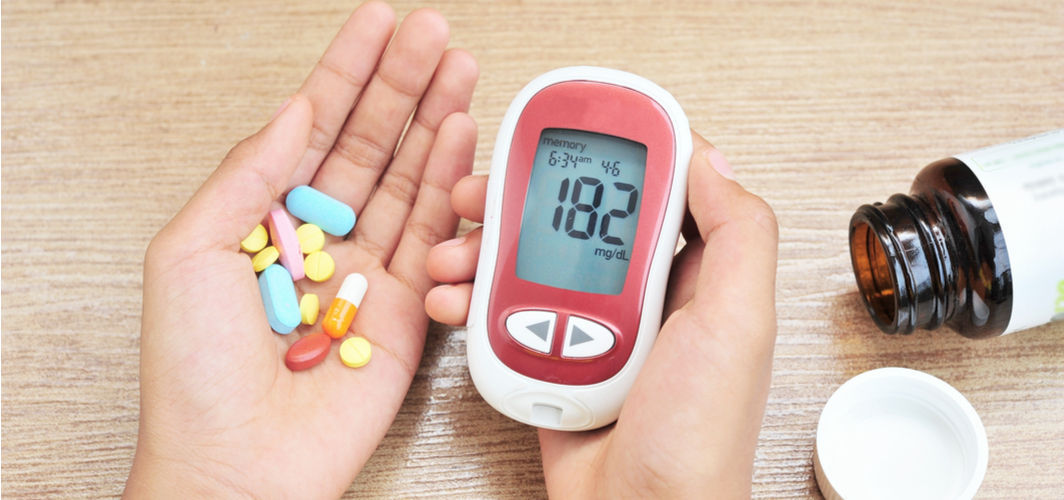Diabetes Management
Blood Pressure Lowering Medicines May Reduce the Risk of Type 2 Diabetes
4 min read
By Apollo 24/7, Published on - 14 February 2022, Updated on - 11 December 2023
Share this article
1
0 like

According to the International Diabetes Federation, as of 2019, about 9.3% of the world’s adult population suffers from diabetes, which is expected to rise to 10.2% by 2030. Diabetes is a chronic condition which, if not managed, can damage vital organs of the body including the heart, kidneys, and blood vessels. However, the use of blood pressure-lowering medications (antihypertensives) is proven to help prevent blood vessel-related life-threatening complications such as stroke and peripheral artery disease in diabetics.
Moreover, a recent study published in the journal The Lancet on 13th November 2021 conducted by scientists from the University of Oxford and Bristol found that some blood pressure-lowering medicines can help reduce the risk of developing diabetes.
Study: The role of anti-hypertensives in preventing diabetes
To investigate the role of antihypertensives in reducing the risk of developing diabetes, scientists conducted two different meta-analyses. In these analyses, scientists included three types of participants:
- Those who consumed a specific type of antihypertensive medicine
- Those who consumed another type of antihypertensive medicines and were followed up for at least 1000 persons-years
- Those who consumed a placebo
Note: Person-years is the total of the number of people in the study and the amount of time spent by each person in the study. For instance, the data is measured in 1000 person-years if a study follows 1000 people for 1 year.
Participants who were already diagnosed with diabetes were excluded from the study.
The first study: In this study, scientists included more than 145000 participants (60.6% men and 39.4% men) who were enrolled in 19 randomised clinical trials. This study aimed at analysing the effect of blood pressure-lowering medicines in reducing the risk of diabetes.
Second study: In the second study, scientists analysed 22 clinical trials conducted between 1973 and 2008 to investigate the effects of five major types of blood pressure medicines on lowering cardiovascular risk. The medicines include angiotensin-converting enzyme inhibitors (ACEIs), angiotensin II receptor blockers (ARBs), beta-blockers, calcium channel blockers (CCBs), and thiazide diuretics.
The participants were divided into the intervention and comparator treatment arms.
- In placebo-controlled trials (that included patients who consumed only one medication), the arm that received the medicine was considered the intervention arm while the other arm that received the placebo was considered the comparator arm.
- In head-to-head trials (that included patients who consumed two or more medicines), the arm that showed lower systolic blood pressure (the upper limit of the blood pressure measurement) was considered as the intervention, while the other one was called the comparator.
Recommended Read: 8 Important Tests For People with Type 2 Diabetes
Findings of the study
All the participants were followed up for an average of 4.5 years. The results of the study showed that:
- A total of 9883 people were diagnosed with new-onset type 2 diabetes.
- The rate of incidence for the development of a new case of type 2 diabetes per 1000 person-years was 16.44 in the comparator group and 15.94 in the intervention group.
- Reducing the systolic blood pressure by 5 mm Hg lowered the risk of developing type 2 diabetes trials by 11%.
The second study revealed that:
- Out of all the blood pressure-lowering medicines, angiotensin-converting enzyme inhibitors and angiotensin II receptor blockers significantly reduced the risk of developing new-onset type 2 diabetes by 16%.
- The use of beta-blockers and thiazide diuretics increased the risk of diabetes development while calcium channel blockers had no effect.
- In a complementary analysis done using the Mendelian randomisation technique, it was found that people who had genetically influenced lower systolic blood pressure had a 12% lower risk of developing type 2 diabetes.
With this study, the scientists concluded that reducing blood pressure could be used as an effective strategy to prevent the onset of type 2 diabetes. They further stated that some classes of antihypertensive medicines could be used as a choice of drug to reduce an individual's clinical risk of diabetes. However, more research needs to be done on this topic before clinical intervention.
Recommended Read: Explained: The Diabetes and Heart Disease Link
Conclusion
Diabetes and high blood pressure are two chronic conditions that increase the risk of developing various critical health complications including heart attacks and strokes. With this research, it has been shown that lowering blood pressure could be an efficient way of reducing the risk of developing diabetes. Scientists believe that doctors should determine the patient’s risk of developing diabetes while choosing an anti-hypertensive drug to lower their blood pressure.
You can also try the Apollo 24|7 Diabetes Self-Management Tool to log your sugar values, track patterns, know all about food nutrition and more.
Diabetes Management
Leave Comment
Recommended for you

Diabetes Management
The Vegan Diet Route For Diabetes Management: Do’s & Dont’s
A vegan diet high in fibre and antioxidants can provide numerous benefits for people with diabetes including lower levels of cholesterol and reduced risk of obesity. However, this type of diet has some challenges, such as nutrient deficiencies and risks associated with processed foods. Therefore, it is crucial to carefully plan meals and seek advice from a healthcare provider to successfully make this dietary shift.

Diabetes Management
Can Diabetics Eat Bananas?
Diabetics can eat bananas but in moderation. Bananas are a good source of fibre, potassium, and vitamins. However, bananas also contain natural sugars, so portion control is important. It's recommended to choose ripe bananas with a lower glycemic index and include them as part of a balanced meal or snack.

Diabetes Management
Suitable Sugar Substitutes for Individuals with Diabetes
If you're battling diabetes and have a sweet tooth to cater to, various suitable sugar substitutes can help you manage your blood sugar levels without compromising on taste. From popular artificial sweeteners such as sucralose and saccharin to natural options such as stevia and monk fruit extract, there's an array of choices available. However, remember to consume these in moderation and balance it with a nutrient-rich diet and regular physical activity.
Subscribe
Sign up for our free Health Library Daily Newsletter
Get doctor-approved health tips, news, and more.
Visual Stories

8 Fruits That are Incredibly Healthy for Diabetes
Tap to continue exploring
Recommended for you

Diabetes Management
The Vegan Diet Route For Diabetes Management: Do’s & Dont’s
A vegan diet high in fibre and antioxidants can provide numerous benefits for people with diabetes including lower levels of cholesterol and reduced risk of obesity. However, this type of diet has some challenges, such as nutrient deficiencies and risks associated with processed foods. Therefore, it is crucial to carefully plan meals and seek advice from a healthcare provider to successfully make this dietary shift.

Diabetes Management
Can Diabetics Eat Bananas?
Diabetics can eat bananas but in moderation. Bananas are a good source of fibre, potassium, and vitamins. However, bananas also contain natural sugars, so portion control is important. It's recommended to choose ripe bananas with a lower glycemic index and include them as part of a balanced meal or snack.

Diabetes Management
Suitable Sugar Substitutes for Individuals with Diabetes
If you're battling diabetes and have a sweet tooth to cater to, various suitable sugar substitutes can help you manage your blood sugar levels without compromising on taste. From popular artificial sweeteners such as sucralose and saccharin to natural options such as stevia and monk fruit extract, there's an array of choices available. However, remember to consume these in moderation and balance it with a nutrient-rich diet and regular physical activity.